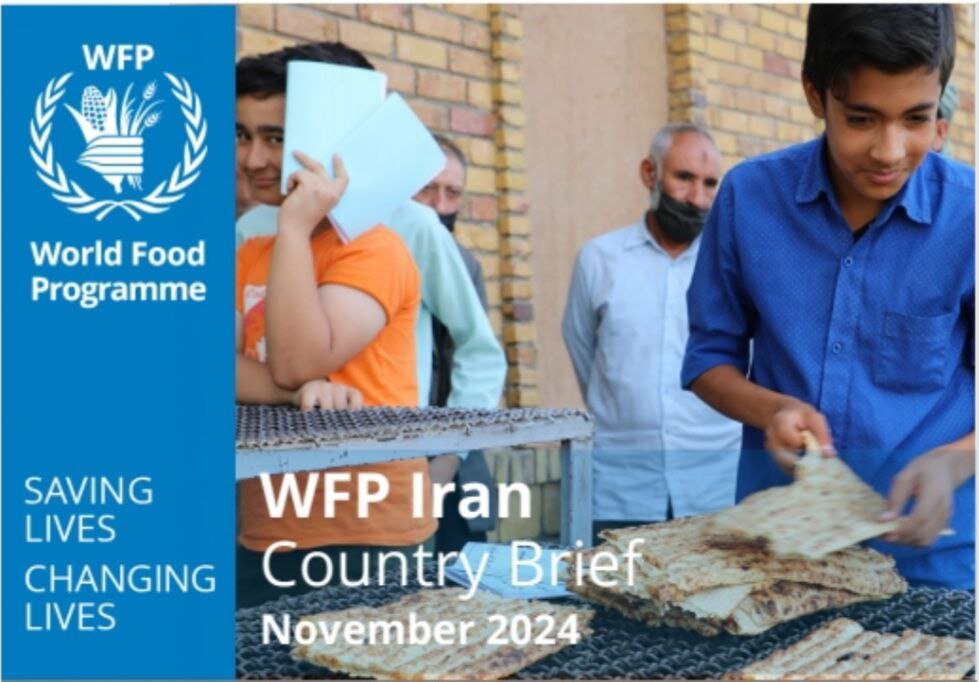WFP releases November report on Iran
WFP releases November report on Iran
TEHRAN –The World Food Program (WFP) has released a report, expounding on activities in Iran over the month of November.

In November, WFP food assistance reached 32,959 beneficiaries, which included Afghan and Iraqi refugees as well as Iranian teachers. Refugees are assisted with a staple food basket which includes fortified wheat flour (12 kg per person per month) and vegetable oil (810 ml per person per month).
In addition to this in-kind food assistance, WFP provides cash assistance to 7,303 Afghan and Iraqi refugee households each month. In November, households headed by refugee men received Iranian Rials (IRR) of 2.5 million (US$ 5, according to the UN Operational Rate) per person.
Households headed by refugee women received a slightly higher monthly cash allocation, amounting to IRR 3 million (US$ 6) per person due to limited access to working opportunities, leading to higher food insecurity.
To maintain beneficiaries’ purchasing power amid deteriorating economic conditions, since June 2023, WFP has increased its cash assistance to vulnerable refugee women and men facing serious risks over their food security and well-being.
The school feeding resumed again after a three-month summer break, and 10,005 refugee school children including their teachers received daily school snacks consisting of date bars and/or fortified biscuits.
However, cash incentive distribution would start upon receipt of the list of schoolgirls, expected this month.
By November 2024, WFP Iran helped ease the financial burden associated with the gluten-free dietary needs of 52 refugee celiac patients from WFP’s beneficiaries by providing them with an extra cash amount of 7.7 million rials (US$ 15.48) per person as a replacement for their usual food entitlement.
To support the income generation and resilience of 300 refugees (49 percent women and 51 percent men), in November, WFP continued supporting the operations of 20 livelihood activities across 17 settlements, including welding, tailoring, baking, and farming.
Following WFP’s Disability Inclusion Workplan 2023, WFP implemented a pilot initiative in two settlements, Shahid Naseri of Markazi and Mohajerin of Semnan provinces, providing refugees with disabilities a monthly cash top-up of IRR 1.5 million (US$ 3) across eight settlements, on top of their regular entitlement.
In November, WFP scaled up its response by assisting an additional 12 refugee since October, reaching a total of 261 persons. This follows the program expansion in October, covering Kerman, Lorestan, West Azarbaijan, Fars, Khuzestan, Markazi, and Semnan provinces.
WFP Iran’s Budget Revision of the Interim Country Strategic Plan (ICSP) was approved in September, leading to adjustments in the Needs Based Plan (NBP). Due to evolving circumstances including the suspension of two planned new refugee settlements to accommodate displaced persons from Afghanistan, the revision made changes as follows.
** Reduced the total planned number of beneficiaries from 52,000 to 35,000.
** Extended the duration of ICSP by two years, now covering April 2023 to December 2027, aligning with the United Nations Sustainable Development Cooperation Framework (SDCF) duration.
The total ICSP budget has increased by USD 5.8 million, bringing it to USD 42.82 million, to account for these adjustments and the plan’s extended timeline.
On April 3, the WFP released its 2023 report on Iran based on the interim Country Strategic Plan (2023-2025). The Islamic Republic of Iran has been hosting millions of Afghan refugees over the past four decades. According to the report, roughly 4.5 million Afghans live in Iran.
Around 33,000 of the most vulnerable documented refugees live in 20 settlements in 13 provinces of Iran. WFP’s response in Iran focuses on addressing the food security needs of the most vulnerable refugees living in settlements.
WFP provides food, education, and livelihood assistance through a hybrid modality of in-kind food, unconditional cash, and capacity strengthening to refugees. In 2023, WFP Iran was able to secure more than 75 percent of its funding and address the daily food requirements of around 33,000 vulnerable refugees.
In addition to the unconditional assistance provided to around 33,000 refugees inside settlements, WFP also provided conditional support for students attending primary schools and junior high schools.
Through WFP’s school meals program, around 8,620 refugee school children (49 percent girls) at primary schools and junior high schools and their 610 Iranian teachers (30 percent women) received nutritious school snacks throughout the scholastic year.
The snacks included fortified milk and either a date bar or whole grain biscuit for every day of school attendance to support their education and nutrition.
Under the same program, around 2,900 girls at primary schools and junior high schools also received cash incentives to support their education in line with girl’s empowerment.
Following the successful establishment of bakeries in some settlements in the past years, WFP supported equipping a bakery in 2023 in one settlement to improve the efficiency of the baking process and the quality of the bread for around 1,400 inhabitants of the settlement.
WFP’s commitment to supporting the government of Iran’s assistance response for crisis-affected populations was further reinforced by WFP ‘s provision of locally procured emergency family food packs to around 9,780 Iranian people affected by an earthquake in Khoy City in May, through its cooperating partner, the Iranian Red Crescent Society (IRCS).
MT/MG
source: tehrantimes.com